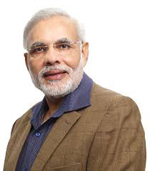 |
| Indian Prime Minister Narendra Modi |
Médecins Sans Frontières warned in a high-profile campaign during the United Nations summit on development in New York that the United States is pressuring Indian Prime Minister Narendra Modi to change the country's intellectual property policies for drugs, which could result in millions of people around the world being unable to access medicines.
MSF relies on affordable generic medicines produced in India to perform its medical work in more than 60 countries and is urging the government to protect India's role as the "pharmacy of the developing world," according to a press release from the organization.
MSF displayed large billboards on trucks outside of Modi's hotel and the Indian consulate in New York with the image of the Taj Mahal made out of pills and the tagline "Incredible India"--a take on the long-standing Indian tourism advertising campaign, the Financial Express newspaper said.
The MSF effort to highlight the intellectual property issue on pharmaceuticals came as world leaders met at the United Nations, including Modi and U.S. President Barack Obama to highlight issue like global healthcare and access to medicines, the Financial Express noted.
"We need affordable medicines from India to do our humanitarian work, so we are not about to let the pharmacy of the developing world be shut down," said Manica Balasegaram, executive director of the MSF Access Campaign, said in the press release. "The health of millions of people around the world will be affected by the decisions Prime Minister Modi makes, so we are urging him not to cave in under overwhelming pressure from the U.S. to change the country's policies to favour big pharma interests."
In August, South African Health Minister Aaron Motsoaledi Motsoaledi, speaking to online publication Scroll.in, said he was "scared and worried" that efforts to haul India up for denying or overturning drugs patented elsewhere would be a step in the wrong direction if successful.
Of particular concern is the use of Section 3(d) of the Indian Patent Act (1970), which has been used by the Indian Patent Office to deny patents on products such as cancer drug Glivec/Gleevec from Swiss-based Novartis ($NVS), among others.
MSF and others counter that the system has made it possible to buy drugs to treat more than 200,000 people living with HIV with Indian generics as well as other diseases, including tuberculosis and malaria. India also produces affordable versions of medicines for noncommunicable diseases, now considered too expensive even for healthcare systems in developed countries.
But India also faces pressure from the U.S. FDA and other regulators abroad to raise the bar on manufacturing standards and data integrity that threaten its ability to export to key markets.
- here's the story from the Financial Express
- and the release from MSF
Related Stories:
Manufacturing issues result in another blow to Sun Pharma from FDA
India to the rescue on U.S. drug prices in wake of Shkreli?
Indian generics bid to challenge Gilead's Sovaldi patent dropped
India's IP policies suit South Africa just fine, official says, wants New Delhi to hold the line
USTR IP watch list heavy on countries in Asia with China and India noted